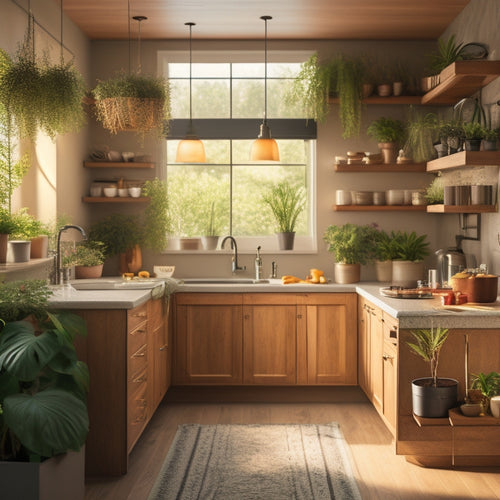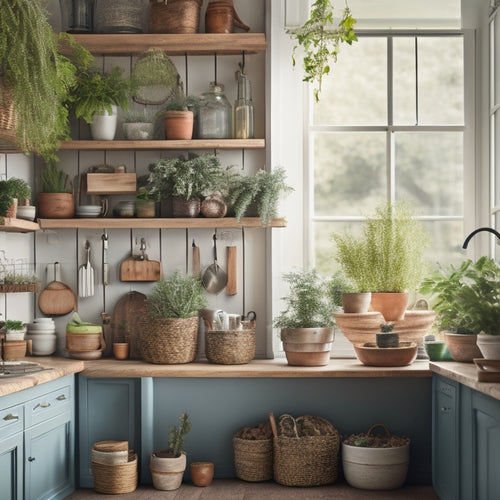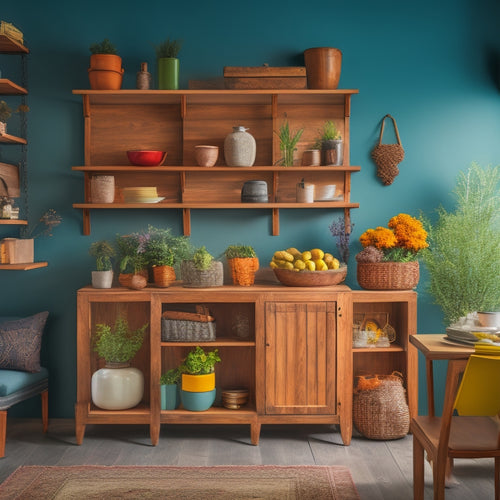
What's Holding You Back From a Clutter-Free Kitchen?
Share
You're stuck in a cluttered kitchen cycle, struggling to break free from habits that hold you back. Maybe you're overwhelmed by clutter buildup or lack organization systems to keep your kitchen tidy. Perhaps limited storage space or difficulty maintaining organization has you feeling stuck. Fear of failure or unwillingness to change habits might also be holding you back. Whatever the reason, it's time to acknowledge the issue and commit to change. By tackling one area at a time and addressing the root causes of your clutter, you'll be on your way to a more functional, peaceful kitchen – and the solutions start right here.
Key Takeaways
• Struggling with cluttered kitchen habits, such as not cleaning up after meals, is a major obstacle to achieving a clutter-free kitchen.
• Lacking kitchen organization systems, including countertops, cabinets, and pantry organization tools, can lead to clutter accumulation.
• Feeling overwhelmed by clutter buildup and its impact on meal prep can prevent individuals from taking action to declutter their kitchen.
• Limited kitchen storage space can make it challenging to organize and maintain a clutter-free kitchen, but creative solutions can help.
• Fear of failure or unwillingness to change kitchen habits can hold individuals back from making progress towards a clutter-free kitchen.
Struggling With Cluttered Kitchen Habits
Since you're reading this, chances are you've found yourself stuck in a cycle of cluttered kitchen habits that are frustratingly hard to break. You're not alone! Many people struggle with cluttered kitchens, but it's great that you're taking the first step towards change.
To spark your decluttering motivation, remind yourself why you want a clutter-free kitchen. Is it to reduce stress, save time, or create a more enjoyable cooking experience? Whatever your reason, keep it in mind as you work towards a more organized space.
Start by tackling one area at a time, like the countertops or pantry. Remove everything and sort items into categories, such as 'keep,' 'donate,' and 'discard.' This will help you see what you really need and what's just taking up space.
Next, implement some simple kitchen organization tips, like assigning a home for each item and using storage containers to keep clutter at bay. Remember, small changes can add up over time. Stay focused, and you'll be on your way to a clutter-free kitchen that serves you and your loved ones.
Lacking Kitchen Organization Systems
What's holding you back from achieving a clutter-free kitchen is likely a lack of effective organization systems that keep your kitchen essentials in check. A well-organized kitchen not only looks great but also makes cooking and serving others a breeze. To get started, take stock of your kitchen layout and identify areas that need improvement.
| Area | Organizing Tools | Decluttering Tips |
|---|---|---|
| Countertops | Spice racks, utensil holders | Clear everything off and sort items into categories |
| Cabinets | Stackable containers, shelf dividers | Purge expired or unused items, and store heavy items below |
| Pantry | Baskets, labels | Group similar items together, and store snacks and ingredients by frequency of use |
Overwhelmed by Kitchen Clutter Buildup
You're likely no stranger to the feeling of being overwhelmed by the sheer amount of clutter that's built up in your kitchen over time. It's like a weight is bearing down on you, making meal prep and cooking a challenging task. Cluttered counters, disorganized cabinets, and a messy pantry create a sense of chaos, making it difficult to find what you need when you need it. Crowded drawers and overflowing shelves only add to the stress.
This buildup didn't happen overnight, but rather gradually, as you accumulated kitchen gadgets, cookbooks, and ingredients. Maybe you've been meaning to get organized, but life got busy, and the clutter just seemed to pile up.
The good news is that you can take control of the situation. Start by acknowledging the problem and committing to making a change. Take small steps towards decluttering and organizing your kitchen. Begin with one area, like the counters or a single cabinet, and work your way through it. As you make progress, you'll feel a sense of relief and empowerment, and cooking will become a joy once again.
Limited Kitchen Storage Space
Limited kitchen storage space exacerbates the clutter problem, forcing you to get creative with where you stash pots, pans, utensils, and gadgets. This is especially challenging when you have limited cabinets, shelves, or countertops to work with.
However, with a little ingenuity, you can turn even the smallest kitchen into a clutter-free haven.
Here are some creative storage solutions to help you maximize your kitchen space:
-
Install shelves, hooks, or a pegboard on walls or the back of a door to utilize vertical space and hang items like pots, utensils, or spices.
-
Invest in multi-tiered storage containers or baskets to store dry goods, snacks, or cleaning supplies, keeping them organized and out of sight.
-
Consider a kitchen cart or island with built-in storage, providing additional counter space and hiding clutter-prone areas like appliances or cookbooks.
Difficulty Maintaining Organized Kitchen
Your newly arranged kitchen can quickly revert to its previous cluttered state if you don't establish habits to maintain the order, making it essential to create a routine that keeps your kitchen tidy and functional.
You need to prioritize time management to ensure you dedicate a few minutes each day to preserving your kitchen's organization. Start by assigning specific tasks to specific days, such as cleaning the counters on Mondays and wiping down the fridge on Thursdays.
Incorporate daily routines that promote a clutter-free kitchen, like putting away dishes immediately after meals or wiping down the stove after cooking. Make it a habit to return items to their assigned spaces after use, and take a few minutes before bed to quickly tidy up the kitchen.
By doing so, you'll maintain the organization you've worked hard to achieve and create a space that's both functional and enjoyable to cook in.
Fear of Kitchen Organization Failure
Fear of failure can creep in, making you hesitant to tackle kitchen organization because you've tried before and ended up back at square one. You may be thinking, 'What's the point of organizing if it's just going to get messy again?' This fear of failure is often rooted in perfectionist tendencies and self-doubt. You might feel like you're not good enough or that you don't have the skills to maintain a clutter-free kitchen.
However, recognizing that kitchen organization is a process, and it's acceptable to make mistakes along the way.
Here are a few things to keep in mind:
-
Don't be too hard on yourself: Remember that it's okay to make mistakes. Instead of giving up, learn from them and move forward.
-
Break it down into smaller tasks: Divide your kitchen organization project into smaller, manageable tasks to avoid feeling overwhelmed.
-
Focus on progress, not perfection: Celebrate your small wins, and don't worry if your kitchen isn't perfect. Every step forward is a step in the right direction.
Unwillingness to Change Kitchen Habits
You've overcome your fear of kitchen organization failure, but now you're facing a new obstacle: the habits that have contributed to the clutter and disorganization in the first place. It's time to acknowledge that your habits, not just your kitchen, need a makeover.
A clutter-free kitchen requires a mindset shift, where you prioritize organization and maintenance over convenience and ease.
To achieve this, you need to make a habit adjustment. Start by identifying the habits that contribute to clutter, such as leaving dirty dishes overnight or not putting away ingredients after cooking. Once you're aware of these habits, create new ones that promote organization, like washing dishes immediately or putting away items as soon as you're done using them.
Frequently Asked Questions
Can a Clutter-Free Kitchen Really Improve My Mental Health?
"Yes, a clutter-free kitchen can improve your mental health by reducing stress and anxiety! By implementing organization tips, you'll reap declutter benefits, boosting mental wellness and creating a sense of calm in your daily life."
How Do I Organize Kitchen Items I Rarely Use but Can't Discard?
You're stuck with items you rarely use but can't discard; consider storage solutions like labeled bins or rotating items on high shelves, and display options with hidden storage, like decorative trunks or coffee tables with built-in storage.
Are There Any Kitchen Organization Apps That Actually Work?
You'll find kitchen organization apps like StillTasty, Yummly, or BigOven helpful, offering virtual pantry management and recipe tracking features to streamline meal planning and grocery shopping, making it easier to maintain a clutter-free kitchen.
Can I Still Have a Clutter-Free Kitchen on a Tight Budget?
You can achieve a clutter-free kitchen on a tight budget by embracing budget-friendly solutions like creative storage, upcycling old items, and DIY organization projects that repurpose items you already own, saving you money and stress.
How Often Should I Declutter My Kitchen to Maintain Organization?
You should declutter your kitchen every 1-3 months to maintain organization, as consistent decluttering frequency helps prevent clutter buildup and increases effectiveness, ensuring your kitchen remains a haven for serving others.
Related Posts
-

Space-Saving Kitchen Island Storage Hacks
You can change your small kitchen into a functional haven with clever space-saving island storage hacks. Start by ins...
-

Countertop Storage Ideas for Small Kitchens
If you're looking to maximize your small kitchen, creative countertop storage solutions can make a big difference. Em...
-

Creative Corner Cabinet Space Management
Creative corner cabinet space management turns neglected nooks into stunning storage solutions. You can maximize vert...


